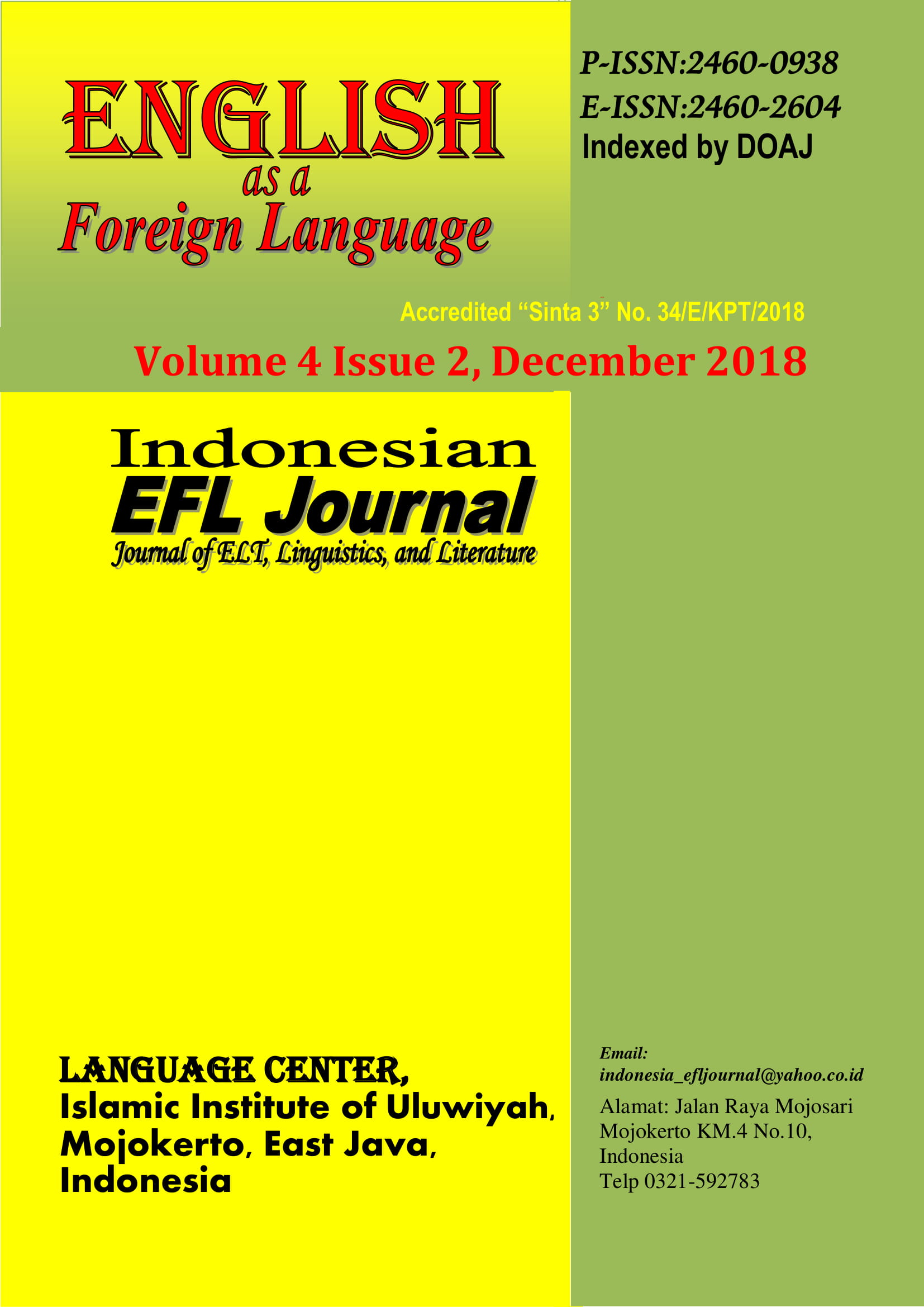The Correlation between Reading Strategies and Reading Achievement Across Learning Styles
Abstract
The study was aimed to analyze the interrelationship between metacognitive reading strategy and reading achievements, the correlation between cognitive reading strategy and reading achievement, and to know the effect between metacognitive and cognitive strategy used by learners across their learning styles. This study used correlation research. The number of population was 315. The researcher chose 113 senior high EFL students at MA Nurul Jadid. Questionnaire and reading comprehension test were used to collect data. The researcher used two questionnaires to measure reading strategies used by the students and students’ learning styles. SPSS V. 20 was used to analyze questionnaires’ data. Descriptive statistics was applied to calculate the mean and standard deviation of 40 individual reading strategies. The results were: metacognitive and cognitive strategies were used in high and medium level when students did the tests. Metacognitive strategy significantly correlated with reading achievement where correlation coefficient is greater than critical value of correlation coefficient while cognitive strategy does not relate mutually to reading achievements. Then, reading strategies significantly affected students’ reading achievement.
References
Burns, Roe, Ross. (1996). Teaching Reading in Today’s Elementary school.New Jersey: Houghton Mifflin Company.
Cohen, A.D. (1990). Strategies in Learning and Using a Second Language. Shanghai: Foreign Language Teaching and Research Press.
Ediger, A. (2001). Teaching children literacy skills in a second language (3rd ed.). In M. Celce-Murcia (Ed.), Teaching English as a second or foreign language (pp.153-169). Boston, MA: Heinle & Heinle.
Latief, M. A. (2012). Research Method on Language Learning: An Introduction. Malang: UM Press.
Li Lai,Ya, Jung Tung, Yu & Ying Luo, Shu. (2008). Theory of Reading Strategies and its Application by EFL Learners: Reflections on Two Case Studies. Taipei: Taipei Municipal University of Education.
Liu, Y.C. (2002). Difference in Choice of Using English Reading Strategies between Successful and Unsuccessful Learners. Foreign Language Teaching, 3: 39-42.
O’Malley, J.M & Chamot, A.V. (1990). Learning Strategy in Second Language Acquisition. Cambridge: Cambridge University Press.
Oxford, R.L. (1990). Language Learning Strategies: What Every Teacher Should Know. New York: Newbery House Publishers.
Phakiti, A. (2003). A Closer Look at the Relationship of Cognitive and Metacognitive Strategy Use to EFL Reading Achievement Test Performance. Language Testing, 20(1): 26-56.
Raudenbush, D. (2013). Cognitive Factors That Affect Reading Comprehension. (online) http.everydaylife.globalpost.com accessed on December 29th , 2013.
Rokhsari, S. (2012). An Investigation of Reading Strategies Used by Iranian EFL Intermediate Readers. Journal of Academic and Applied Studies, 2(8): 1- 21.
Ru Tsai, Y. (2012). Investigating the Relationships among Cognitive Learning Styles, Motivation and Strategy Use in Reading English as a Foreign Language. International Journal of Business and Social Science, 3(13).
Sulistyo, G. H. (2011). Reading For Meaning. Malang: Pustaka Kaiswaran Press.
Wang, X.L. (2002). An Investigation on the Factors that Affect Non-English Majors’ Reading Comprehension Proficiency. Foreign Languge Teaching and Research, 1: 69-75.
Copyright (c) 2018 Indonesian EFL Journal: Journal of ELT, Linguistics, and Literature

This work is licensed under a Creative Commons Attribution-ShareAlike 4.0 International License.
All rights reserved.
this publication may be reproduced, stored in a retrieval system, or transmitted
in any form or by any means, electronic, mechanical, photocopying, recording.




